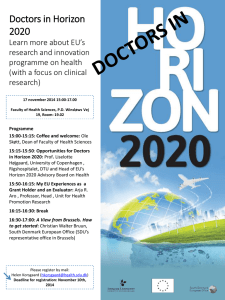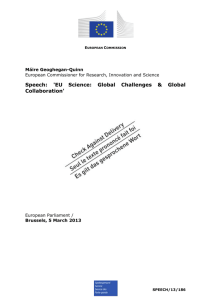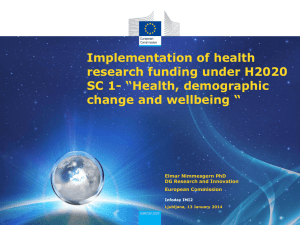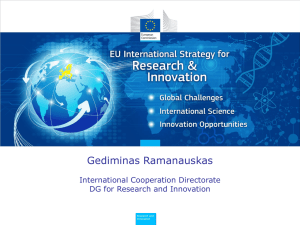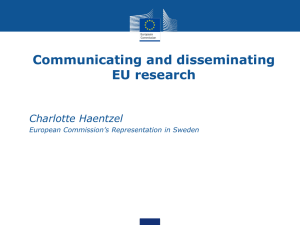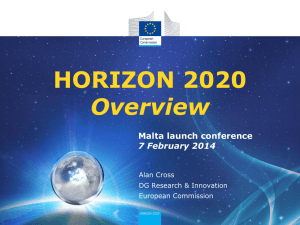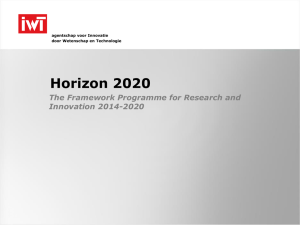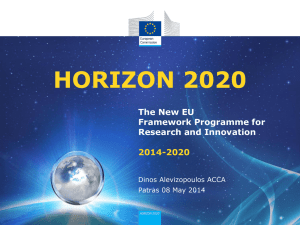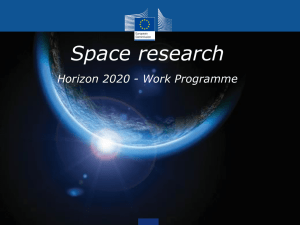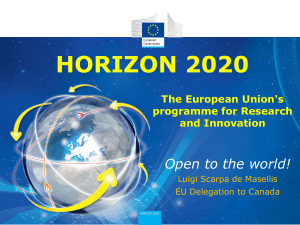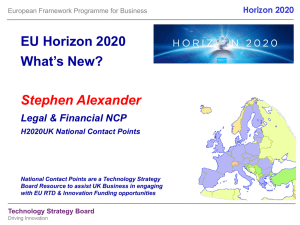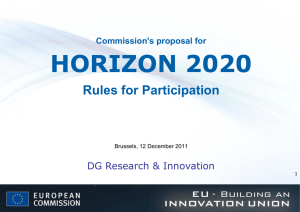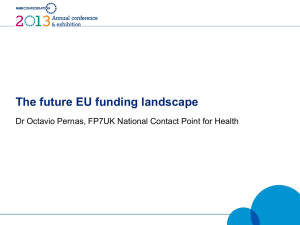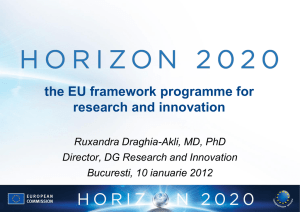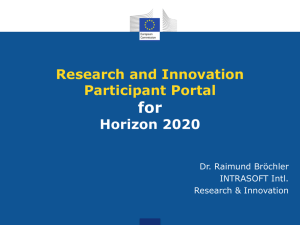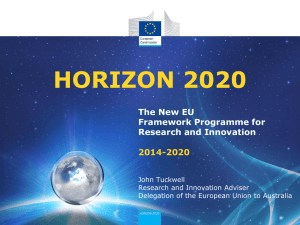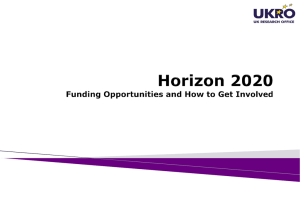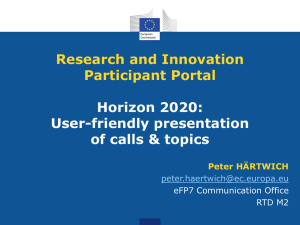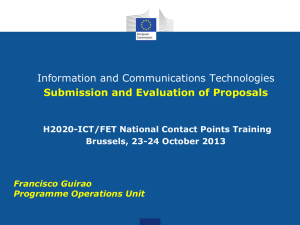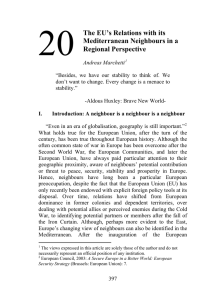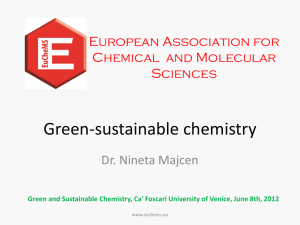Introduction to Horizon 2020
advertisement
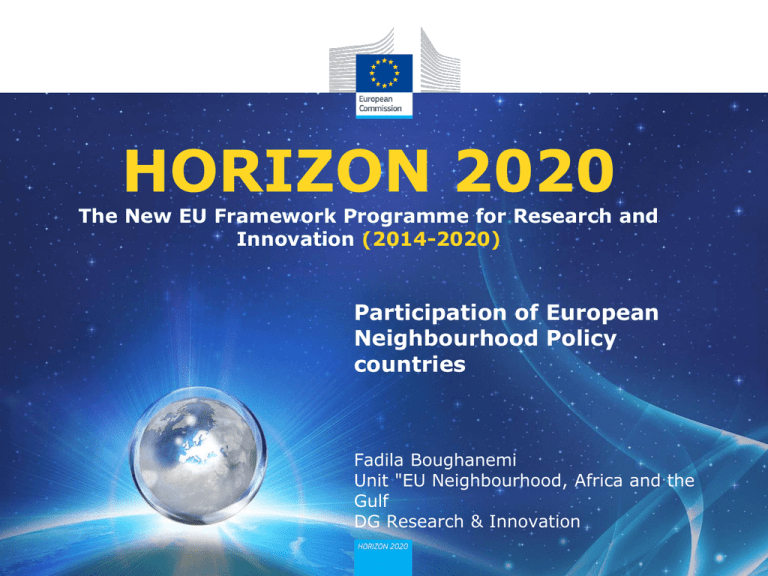
HORIZON 2020 The New EU Framework Programme for Research and Innovation (2014-2020) Participation of European Neighbourhood Policy countries Fadila Boughanemi Unit "EU Neighbourhood, Africa and the Gulf DG Research & Innovation What is Horizon 2020? • Framework funding programme for all EU research & innovation-related activities (2014-2020) • The total budget in constant prices €70,2 billion • A core part of Europe 2020, Innovation Union & European Research Area: − Responding to the economic crisis to invest in future jobs and growth − Addressing people’s concerns about their livelihoods, safety and environment − Strengthening EU’s position in research, innovation and technology Three priorities Excellent science Industrial leadership Societal challenges Priority 1. Excellent science funding (€ million, 2014-2020) European Research Council (ERC) Frontier research by the best individual teams Future and Emerging Technologies Collaborative research to open new fields of innovation 13 095 2 696 Marie Skłodowska-Curie actions (MSCA) Opportunities for training and career development 6 162 Research infrastructures (including e-infrastructure) Ensuring access to world-class facilities 2 488 Priority 2. Industrial leadership funding (€ million, 2014-2020) Leadership in enabling and industrial technologies (LEITs) (ICT, nanotechnologies, materials, biotechnology, manufacturing, space) 13 557 Access to risk finance Leveraging private finance and venture capital for research and innovation Innovation in SMEs Fostering all forms of innovation in all types of SMEs 2 842 616 + complemented by expected 20% of budget of societal challenges + LEITs and 'Access to risk finance' with strong SME focus Priority 3. Societal challenges funding (€ million, 2014-2020) Health, demographic change and wellbeing 7 472 Food security, sustainable agriculture and forestry, marine and maritime and inland water research and the Bioeconomy 3 851 Secure, clean and efficient energy * 5 931 Smart, green and integrated transport 6 339 Climate action, environment, resource efficiency and raw materials 3 081 Inclusive, innovative and reflective societies 1 309 Secure societies 1 695 Science with and for society 462 Spreading excellence and widening participation 816 Simplification: summary Single set of simpler and more coherent participation rules New balance between trust and control Moving from several funding rates for different beneficiaries and activities to just two Replacing the four methods to calculate overhead or «indirect costs» with a single flat rate Major simplification under the forthcoming financial regulation Successful applicants to get working more quickly: reduction of average time to grant by 100 days (current average of around 350 days under FP7) International Cooperation in Horizon 2020 •International cooperation is crucial to address many Horizon 2020 objectives •Principle of general openness: the programme will remain to be the most open funding programme in the world •Need to join forces globally to tackle global challenges New strategy for international cooperation in research and innovation Need to engage more actively and strategically in international cooperation: Three main objectives: - Strengthen the Union's excellence and attractiveness in research and innovation - Tackle global societal challenges - Support the Union's external policies Combining openness with better targeted actions Strengthened partnership with Member States Stronger contribution of research and innovation to external policies of the Union Dual approach Openness: Horizon 2020 open to participation from across the world Revision to the list of countries which receive automatic funding Targeted actions: 1. Thematic: identifying areas for international cooperation on the basis of the Union's policy agenda 2. Differentiation by countries/regions to target partners for cooperation multi-annual roadmaps for cooperation with key partners Multi-annual roadmaps for cooperation with countries/regions Enlargement and neighbourhood countries, and EFTA Focus on alignment with the ERA Support enlargement and neighbourhood policies (support to developing a common 'Knowledge and Innovation Space') Industrialised countries and emerging economies Focus on competitiveness Tackle global challenges Business opportunities and access to new markets Developing countries Support development policy by building partnerships contributing to sustainable development Address relevant challenges (e.g. poverty-related diseases, energy and food security, biodiversity) Cooperation status in terms of policy in the Mediterranean region A new response to a changing Neighbourhood Development of Common Knowledge and Innovation Space (CKIS) New approach to cooperation: mutual benefit, mutual accountability and differentiation New impetus given by the Euro-Mediterranean Conference for Research and Innovation held in Barcelona (2-3/04/2012) Thematic areas addressed: water, energy, health, transport and marine sciences. Key cross-cutting issues addressed: Innovation, changing society, coordination of programmes, infrastructure, mobility New strategy on International Cooperation on Research and Innovation Need to access knowledge produced outside Europe Need to promote Europe as an attractive location and partner for research and innovation Need to join forces globally to tackle global challenges EU – South Mediterranean R&I cooperation Specific activities to promote the EU – South Mediterranean cooperation Support to bilateral activities (Bilats) Support to regional platforms INCO-Nets (MIRA/MedSPRING) Building competence in research labs (ERA-WIDEs) ERANET MED Bridging the gap between research and innovation (R2I) EU – South Mediterranean R&I cooperation Bilateral policy dialogues 5 S&T agreements: Algeria, Egypt, Jordan, Morocco, Tunisia 2 association agreements in FP7: Israel, Turkey Bi-regional policy dialogue The Monitoring Committee for Euro-Mediterranean Cooperation in RTD (MoCo) -17 meetings since 1995 EU – South Mediterranean R&I cooperation in FP7 (2007-2013) 296 FP7 funded projects ● Success rate – 13% ● 704 million EUR EU contribution to the projects ● 62 million EUR EU contribution to the South Mediterranean partners ● 586 participations of public and private South Mediterranean institutions ● Main thematic areas of cooperation –KBBE, Environment, ICT . Synergy with the European Neighbourhood Partnership Instrument (ENPI) The ENPI supports research capacity building through the implementation of Research Development and Innovation Programme (RDI): Algeria (21 M€), Egypt (11 M€ + 20 M€), Jordan (5+5 M€), Morocco (1.35 M€), Tunisia (12 M€) Participation in Horizon 2020 as Third Country • As a general rule, the legal entities and individuals established in the ENP countries may participate in all parts of the programme (exception: access to risk finance) • The minimum rules of participation should be observed - For standard collaborative actions: At least three legal entities each established in a different Member State or an Associated Country - For ERC, SME instrument, programme co-fund, coordination and support, training and mobility actions: One legal entity established in a Member State or in an Associated Country Additional conditions can be set out in the work programme or work plan, e.g. number of participants, type of participants etc. Participation in Horizon 2020 as Associated Country • ENP countries already associated to FP7 are eligible for association without pre-conditions (Art. 7.1.c) • ENP countries, not previously associated, have to fulfill four criteria (Art. 7.1.b) - Close economic and geographical links with the Union - Good capacity in science, technology and innovation - Good track record of previous FP participation - Fair and equitable treatment of IPR Useful links and publications http://ec.europa.eu/research/horizon2020/index_en.c fm http://ec.europa.eu/research/iscp/index.cfm http://ec.europa.eu/research/iscp/pdf/neighbourhood _policy.pdf http://ec.europa.eu/research/iscp/pdf/projects_in_su pport_publication.pdf Thank you for your attention! HORIZON 2020 Contact point for more information: fadila.boughanemi@ec.europa.eu
